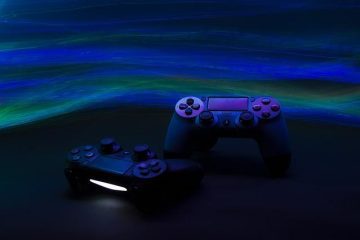Table of Contents
- Understanding the GameCube Controller Legacy
- Key Features That Enhance Your Gaming Experience
- Choosing the Right GameCube Controller for Your Needs
- Top GameCube Controller Alternatives on the Market
- Tips for Maintaining and Optimizing Your Controller Performance
- Q&A
- Wrapping Up


Understanding the GameCube Controller Legacy
The GameCube controller’s design and functionality have left a lasting imprint on gaming culture, setting a standard that many modern controllers strive to achieve. Renowned for its distinctive layout, the controller features a comfortable grip and a combination of buttons that allows for intuitive gameplay. Its unique arrangement, including the oversized A button, makes it instantly recognizable and has contributed to its enduring legacy among gamers. The emphasis on ergonomics ensures that players can enjoy prolonged gaming sessions without discomfort, cementing the controller’s reputation as one of the best in the industry.
In addition to its physical attributes, the GameCube controller excelled in gameplay mechanics, excelling in genres such as platformers and fighting games. With its analog sticks offering precise control and sensitivity adjustments, players could execute intricate moves with ease. Titles like Super Smash Bros. Melee highlighted its strengths, showcasing competitive play where rapid button presses and deft thumb movements were necessary. As a result, the GameCube controller is not just a relic of gaming history; it’s a venerable tool that continues to be favored for competitive gaming even today.
The legacy of the GameCube controller is further amplified by its versatility and retro appeal. Many gaming enthusiasts appreciate the nostalgia it brings, leading to a resurgence in its popularity among both new and veteran players. Compatibility with modern systems through adapters has allowed existing fans to continue using their beloved controllers. This intertwining of nostalgia and functionality is evident in the growing market for custom designs and collector’s editions, demonstrating how the GameCube controller has transcended its original purpose and become a celebrated emblem of gaming history.
Key Features That Enhance Your Gaming Experience
The GameCube controller is beloved for its unique design and responsive controls, making it a favorite among gamers. One of its most notable features is the ergonomic layout, which offers a comfortable grip and intuitive access to buttons and triggers. This design allows players to stay engaged for longer periods without experiencing discomfort, enhancing gameplay during intense sessions. The placement of the analog stick and the face buttons is optimized for quick maneuverability, catering to both casual and competitive gaming styles.
Another standout aspect is the controller’s analog sensitivity. The triggers and thumbsticks are finely tuned to detect subtle variations in input, providing a level of precision that is crucial for navigating complex game environments. This feature is particularly useful in titles that require pinpoint accuracy, such as racing simulators and first-person shooters. Players can execute delicate movements or rapid actions seamlessly, giving them an edge over opponents who may rely on less responsive controllers.
The vibration feedback feature is yet another enhancement that elevates the gaming experience. This function allows players to feel the game through haptic responses, adding a layer of immersion that static controllers simply cannot match. For example, players can sense the impact of a collision or the rumble of an engine revving, creating a visceral connection to the gaming world. As a result, this multi-sensory feedback contributes to a more engaging and enjoyable gaming experience, making every victory feel even more rewarding.


Choosing the Right GameCube Controller for Your Needs
When it comes to selecting a GameCube controller, consider the type of games you plan to play and your personal comfort preferences. Different controllers may offer unique features that can enhance your gaming experience. For example, if you’re diving into competitive titles like Super Smash Bros., a controller with a precise analog stick and responsive buttons might be key. Conversely, if you enjoy casual gaming sessions, a standard controller design with straightforward functionality may serve you well. Don’t forget to test out the feel of the grips and button placement to ensure a comfortable hold during extended play.
Another important aspect to consider is compatibility. While many third-party controllers claim to be ”GameCube-style,” not all may work seamlessly with various consoles or PC systems. Look for options that specifically state their compatibility with the GameCube, Wii, or Wii U, depending on your setup. Additionally, examining user reviews can provide insight into potential connectivity issues and overall performance. Make sure you choose controllers with built-in systems that suit your gaming setup to avoid frustration during gameplay.
Lastly, think about your budget and whether you’re looking for original or third-party options. Authentic GameCube controllers can be a bit pricey, especially if they are new or in perfect condition. However, third-party controllers can often offer similar features at a lower cost, although quality can vary significantly. To assist in your decision-making, here is a simple table comparing key features:
| Controller Type | Compatibility | Price Range | Notable Features |
|---|---|---|---|
| Original GameCube | GameCube, Wii | $30 – $60 | Classic design, ergonomic grips |
| Third-Party Wireless | PC, Switch | $20 – $50 | Wireless functionality, customizable buttons |
| USB Adapter | PC, Switch | $10 – $25 | Many GameCube controllers can be used with USB support |


Top GameCube Controller Alternatives on the Market
For gamers seeking alternatives to the original GameCube controller, there are several options that blend nostalgia with modern capabilities. Compatible wireless controllers have become increasingly popular, offering the freedom of wireless connectivity without sacrificing the feel of classic gameplay. Many of these alternatives feature similar button layouts and ergonomics, ensuring a seamless gaming experience that feels just like the original.
Another viable choice is the third-party wired controllers that replicate the GameCube style. These controllers are designed to maximize comfort while providing impressive responsiveness. Some of the standout features to look for include adjustable sensitivity and customizable buttons, allowing gamers to tailor their setup according to their preferences. Below are a few notable models:
| Controller Name | Connectivity | Key Features |
|---|---|---|
| PowerA GameCube-style Controller | Wired | Ergonomic design, dual analog sticks, responsive buttons |
| Hori Battle Pad | Wired | Asymmetrical layout, snapshot button, customizable inputs |
| eXtreme Gaming GameCube Replacement Controller | Wired | Classic tactile feedback, vibrational support |
Lastly, gamers should consider adapter solutions, which allow them to use their existing GameCube controllers with modern consoles or PCs. These adapters bridge compatibility gaps, enabling users to enjoy their favorite titles with hardware that feels familiar. Solutions like the Mayflash GameCube Controller Adapter offer straightforward plug-and-play functionality, often supporting both USB and Wii U connectivity, making it a versatile addition to any gaming setup. With these alternatives at your fingertips, gamers can experience the rich legacy of the GameCube with enhanced flexibility and performance.


Tips for Maintaining and Optimizing Your Controller Performance
To enhance the longevity and functionality of your GameCube controller, it’s essential to periodically clean it. Start by unplugging the controller and using a soft, damp cloth to wipe down the exterior surfaces. Pay special attention to the areas around the buttons and joystick, where dirt and grime can accumulate. For more intensive cleaning, consider using a small amount of isopropyl alcohol on a microfiber cloth to eliminate stubborn residue. Additionally, keep the controller stored in a cool, dry place to prevent moisture buildup, which can lead to damage over time.
Calibration plays a crucial role in maintaining controller performance. If you notice any inconsistencies with button response or joystick drift, recalibrating the controller can often resolve these issues. For GameCube controllers connected to a Wii or Wii U, navigate to the settings menu to access the calibration tool. Make sure to follow the on-screen instructions carefully, ensuring each button and joystick movement is recognized. Regular calibration checks can help maintain optimal performance and responsiveness during gameplay.
Another factor to consider is the wiring and connections. Over time, the cord may become frayed, or the connectors can accumulate dust. Inspect your GameCube controller regularly for any visible wear and tear. If you find any damage, it might be time to replace the controller or seek professional repair services. To prevent future issues, try to avoid yanking on the cord when unplugging and always handle the controller gently. Keeping an eye on connectivity can help ensure smoother gaming sessions without unexpected disruptions.
Q&A
Q&A: GameCube Controller
Q1: What makes the GameCube controller unique compared to other controllers? A1: The GameCube controller is known for its distinct ergonomic design, featuring a compact and curved shape that fits comfortably in the hands. Its button layout, with a combination of large, colorful buttons and an analog stick, offers a unique tactile experience. Unlike many other controllers, the GameCube controller includes a centralized “Z” button and a digital D-pad, which enhances gameplay, especially in faster-paced titles.Q2: Can I use a GameCube controller on other gaming systems? A2: Yes, you can use GameCube controllers on various systems, notably the Wii and Wii U, through adapters. Many third-party adapters also allow for compatibility with PC and other consoles. However, the functionality may vary based on the game and the specific adapter in use. For instance, Super Smash Bros. Ultimate on the Nintendo Switch supports GameCube controllers via the official adapter, adding versatility for competitive players.
Q3: What are the primary games that benefit from using a GameCube controller? A3: Titles such as “Super Smash Bros. Melee,” “Mario Kart: Double Dash,” and “The Legend of Zelda: The Wind Waker” are commonly associated with the GameCube controller due to the intuitive layout and comfort it provides. Players often favor it for fighting games and platformers, where precise control is key to performance.
Q4: How does the GameCube controller compare to modern controllers? A4: While modern controllers like those for the PlayStation and Xbox have embraced wireless technology and advanced features (like haptic feedback), the GameCube controller remains lauded for its simplicity and comfort. Its layout prioritizes accessibility, making it a favorite among nostalgic gamers and a preferred choice for certain competitive environments, particularly in the Super Smash Bros. community.
Q5: Is the GameCube controller suitable for newcomers to gaming? A5: Yes, the GameCube controller’s user-friendly design makes it ideal for newcomers. The large, clearly marked buttons help new players easily identify controls without feeling overwhelmed. Its analog sticks provide a smoother and more natural gameplay experience, fostering quick learning curves for beginners.
Q6: Where can I purchase a GameCube controller today? A6: GameCube controllers can be found at various retailers both online and in-store. Websites like Amazon, eBay, and specialty gaming shops often carry both original and third-party versions. Be sure to check compatibility if you plan to use it with a different console. For the best deal, consider purchasing used controllers to save money while still enjoying this classic gaming accessory.
Q7: How do I maintain my GameCube controller for longevity? A7: To keep your GameCube controller in optimal condition, regularly clean it by removing dust and debris from the buttons and analog sticks. Avoid using excessive moisture; a lightly damp cloth with mild soap is usually sufficient. Also, store the controller in a cool, dry place away from extreme temperatures to prevent damage to the internal components.— Each question and answer in this section provides insight into various aspects of the GameCube controller, making it easier for readers to understand its value in the gaming community. Whether you’re a veteran player or a curious newcomer, this Q&A aims to satisfy your questions about this classic gaming accessory.




0 Comments